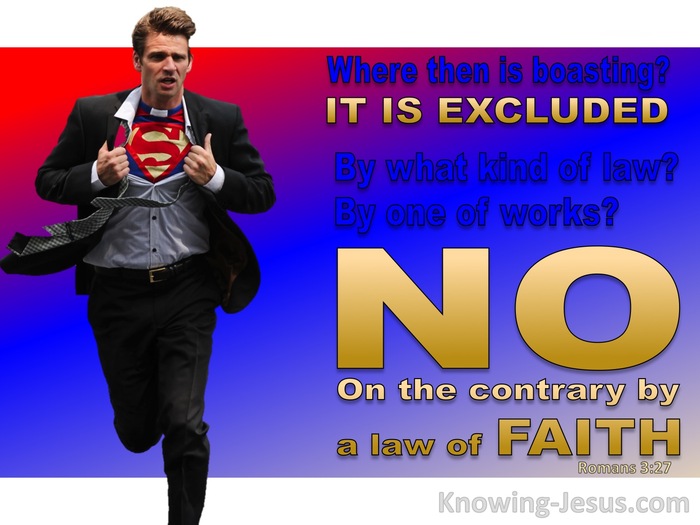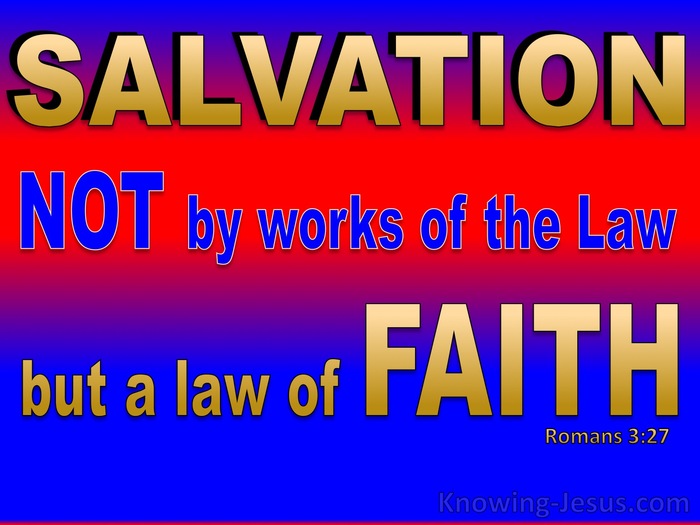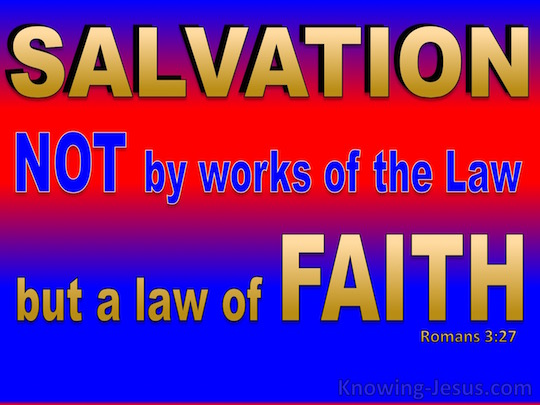Parallel Verses
Twentieth Century New Testament
What, then, becomes of our boasting? It is excluded. By what sort of Law? A Law requiring obedience? No, a Law requiring faith.
New American Standard Bible
Where then is
King James Version
Where is boasting then? It is excluded. By what law? of works? Nay: but by the law of faith.
Holman Bible
Where then is boasting?
International Standard Version
What, then, is there to boast about? That has been eliminated. On what principle? On that of actions? No, but on the principle of faith.
A Conservative Version
Where then is the boasting? It is excluded. By what law, of works? No, but by a law of faith.
American Standard Version
Where then is the glorying? It is excluded. By what manner of law? of works? Nay: but by a law of faith.
Amplified
Then what becomes of [our] boasting? It is excluded [entirely ruled out, banished]. On what principle? On [the principle of good] works? No, but on the principle of faith.
An Understandable Version
Where then is the [basis for] boasting [i.e., over being right with God]? There is not any. Is it by [obedience to] a law? Is it by doing certain deeds? Not at all, but by a law of faith.
Anderson New Testament
Where, then, is boasting? It is excluded. By what law? Of works? No; but by the law of faith.
Bible in Basic English
What reason, then, is there for pride? It is shut out. By what sort of law? of works? No, but by a law of faith.
Common New Testament
Where then is our boasting? It is excluded. On what law? On the law of works? No, but on the law of faith.
Daniel Mace New Testament
what reason then is there for boasting? it is excluded. what, by the ceremonial law? no: but by the law of faith.
Darby Translation
Where then is boasting? It has been excluded. By what law? of works? Nay, but by law of faith;
Godbey New Testament
Then where is boasting? It is excluded. By what law? of works? No; but by the law of faith.
Goodspeed New Testament
Then what becomes of our boasting? It is shut out. On what principle? What a man does? No, but whether a man has faith.
John Wesley New Testament
Where is boasting then? It is excluded. By what law? Of works?
Julia Smith Translation
Where then boasting? It was excluded. By what law? of works? No: but by the law of faith.
King James 2000
Where is boasting then? It is excluded. By what law? of works? Nay: but by the law of faith.
Lexham Expanded Bible
Therefore, where [is] boasting? It has been excluded. By what kind of law? Of works? No, but by a law of faith.
Modern King James verseion
Then where is the boasting? It is excluded. Through what law? Of works? No, but through the law of faith.
Modern Spelling Tyndale-Coverdale
Where is then thy rejoicing? It is excluded. By what law? By the law of works? Nay: but by the law of faith.
Moffatt New Testament
Then what becomes of our boasting? It is ruled out absolutely. On what principle? On the principle of doing deeds? No, on the principle of faith.
Montgomery New Testament
Then what becomes of boasting? It is shut out. What sort of law forbids it? A law of works? No, but a law of faith.
NET Bible
Where, then, is boasting? It is excluded! By what principle? Of works? No, but by the principle of faith!
New Heart English Bible
Where then is the boasting? It is excluded. By what manner of law? Of works? No, but by a law of faith.
Noyes New Testament
Where then is the boasting? It is excluded. By what law? of works? Nay; but by the law of faith.
Sawyer New Testament
Where then is the boasting [of the Jew]? It is excluded. By what law? Of works? No; but by the law of faith.
The Emphasized Bible
Where, then, the boasting! It is excluded. Through what kind of law? Of works? Nay! but through a law of faith:
Thomas Haweis New Testament
Where then is boasting? It is excluded. By what law? of works? No: but by the law of faith.
Webster
Where is boasting then? It is excluded. By what law? of works? No; but by the law of faith.
Weymouth New Testament
Where then is there room for your boasting? It is for ever shut out. On what principle? On the ground of merit? No, but on the ground of faith.
Williams New Testament
So where has human boasting gone? It was completely shut out. On what principle? On that of doing something? No, but on the principle of faith.
World English Bible
Where then is the boasting? It is excluded. By what kind of law? Of works? No, but by a law of faith.
Worrell New Testament
Where, then, is the boasting? It was excluded. By what manner of law? Of works? Nay; but by a law of faith.
Worsley New Testament
Where then is boasting? it is excluded: by what law? of works? no: but by the law of faith.
Youngs Literal Translation
Where then is the boasting? it was excluded; by what law? of works? no, but by a law of faith:
Themes
Interlinear
Dia
Dia
References
Word Count of 37 Translations in Romans 3:27
Prayers for Romans 3:27
Verse Info
Context Readings
Boasting Excluded
26 As a proof, I repeat, at the present time, of his own righteousness, that he might be righteous in our eyes, and might pronounce righteous the man who takes his stand on faith in Jesus. 27 What, then, becomes of our boasting? It is excluded. By what sort of Law? A Law requiring obedience? No, a Law requiring faith. 28 For we conclude that a man is pronounced righteous on the ground of faith, quite apart from obedience to Law.
Cross References
Romans 2:23
Boasting, as you do, of your Law, do you dishonor God by breaking the Law?
Romans 4:2
If he was pronounced righteous as the result of obedience, then he has something to boast of. Yes, but not before God.
1 Corinthians 1:29-31
So that in his presence no human being should boast.
Romans 2:17
But, perhaps, you bear the name of 'Jew,' and are relying upon Law, and boast of belonging to God, and understand his will,
Mark 16:16
He who believes and is baptized shall be saved; but he who refuses to believe will be condemned.
Luke 18:9-14
Another time, speaking to people who were satisfied that they were religious, and who regarded every one else with scorn, Jesus told this parable--
John 3:36
He who believes in the Son has Immortal Life, while he who rejects the Son will not even see that Life, but remains under 'God's displeasure.'
Romans 3:19
Now we know that everything said in the Law is addressed to those who are under its authority, in order that every mouth may be closed, and the whole world become liable to the judgment of God.
Romans 7:21
This, then, is the law that I find-When I want to do right, wrong presents itself!
Romans 7:23
But throughout my body I see a different law, one which is in conflict with the law accepted by my reason, and which endeavors to make me a prisoner to that law of Sin which exists throughout my body.
Romans 7:25
Thank God, there is deliverance through Jesus Christ, our Lord! Well then, for myself, with my reason I serve the Law of God, but with my earthly nature the Law of Sin.
Romans 8:2
For through your union with Christ Jesus, the Law of the life- giving Spirit has set you free from the Law of Sin and Death.
Romans 9:11
For in order that the purpose of God, working through selection, might not fail-a selection depending, not on obedience, but on his Call-Rebecca was told, before her children were born and before they had done anything either right or wrong,
Romans 9:32
And why? Because they looked to obedience, and not to faith, to secure it. They stumbled over 'the Stumbling-block.'
Romans 10:5
For Moses writes that, as for the righteousness which results from Law, 'those who practice it will find Life through it.'
Romans 11:6
But if in love, then no longer as a result of obedience. Otherwise love would cease to be love.
1 Corinthians 4:7
For who makes any one of you superior to others? And what have you that was not given you? But if you received it as a gift, why do you boast as if you had not?
Galatians 2:16
So we placed our faith in Christ Jesus, in order that we might be pronounced righteous, as the result of faith in Christ, and not of obedience to Law; for such obedience 'will not result in even one soul's being pronounced righteous.'
Galatians 3:22
But the words of Scripture represent the whole world as being in bondage to sin, so that the promised blessing, dependent, as it is, upon faith in Jesus Christ, may be given to those who have faith in him.
Ephesians 2:8-10
For it is by God's loving-kindness that you have been saved, through your faith. It is not due to yourselves; the gift is God's.
1 John 5:11-12
And that testimony is that God gave us Immortal Life, and that this Life is in his Son.






